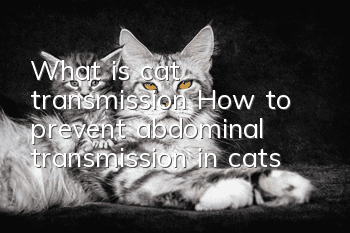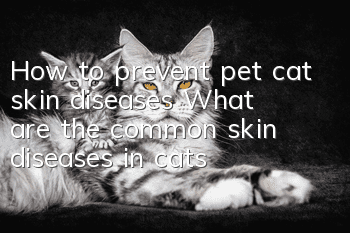What is cat transmission? How to prevent abdominal transmission in cats?

Cat owners may be familiar with feline transmission, but there are also many pet owners who don’t know what feline transmission is and what the symptoms are. What should you do if your cat gets it? Let’s learn about feline transmission together.
The full name of feline peritonitis is "feline infectious peritonitis", abbreviated as FIPV in English. It is a highly lethal, immune-mediated disease. This disease is caused by the mutation of feline coronavirus and is highly contagious. It can be excreted through oral and respiratory secretions, urine and feces, and infects all cats.
Feline transmission of abdominal disease mostly occurs in young cats with low immunity. Cats raised in groups often have a higher incidence rate. Cats may have symptoms for a short period of time or may last for several weeks. Observing the cat’s condition carefully and going to the hospital as soon as possible is particularly important for the cat’s subsequent treatment.
If cats get wet feline transmission, most of them will die within two months of onset. In the early stages of the disease, fever, loss of appetite, and weight loss appear. After the pleural effusion increases, breathing may be difficult and rapid, and some cats may also develop jaundice.
How to prevent feline transmission?
As mentioned earlier, cat abdominal transmission is caused by the mutation of coronavirus, so we need to start from two aspects to fundamentally prevent cat abdominal transmission.
1. Keep it clean
To avoid intra-abdominal transmission from cats, you must first avoid feline coronavirus infection. The cleanliness of the cat’s living environment cannot be ignored. Therefore, it is best for cat owners to be more diligent in their daily lives, keep the environment clean and hygienic, and allow each cat to have its own space to move around, so as to reduce the probability of cats being infected with coronavirus.
2. Improve immunity
Many diseases destroy the cat's immune system, and the same is true for cat abdominal transmission. Therefore, when a cat's immunity is too low, it is easy to be infected by cat abdominal infection. It is necessary to strengthen the feeding and management of cats to ensure adequate nutrition. You can give cats some highly nutritious staple foods to enhance their body resistance and prevention, so as to effectively reduce the incidence of disease.
3. Avoid stress reaction
Stress and a multi-cat household environment may accelerate virus replication, increase the production of virus mutants, and promote the development of feline transmission. Cats are very sensitive animals, and behaviors such as moving, forced walking, and bringing in new cats may cause stress. Owners should carefully observe the cat's reaction and try to avoid irritation to the cat in unfamiliar environments.
- Symptoms of mental depression in cats and the resulting diseases
- Do hairless cats need to supplement taurine? What are the benefits?
- Why does a cat urinate frequently and have low urine output? You must pay attention to it!
- How to correct a kitten that only eats meat and not cat food
- Why does the cat vomit green water?
- Are there any Siamese cats with folded ears? What kind of Siamese cat does your family have?
- What are the benefits of cats eating pork liver?
- Cat butt stinks
- Why can't a cat urinate?
- How to fight against cat hairballs? Analysis of the causes of cat hairballs!



